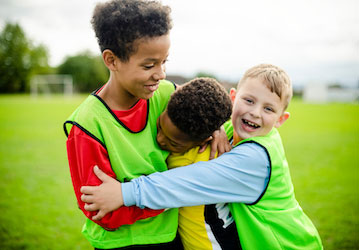Physical activity, whether it’s sports, structured exercise, or unstructured exercise, helps develop positive character in kids. As a busy military parent, encouraging activity is a basic strategy you can use to keep the kids on the right track, while also setting up healthy habits for the future. When your family is set up for success you have more mental energy to focus on the mission. Plus, getting involved in sports or working out together as a family is a great way to stay physically mission-ready while also building the relationships (in your family and in your community) that support performance.
What is “positive development”?
As people with young children can attest, wondering “how do I raise my child to be a good person” is very real concern and can be a source of some anxiety. But keeping your kids active and engaged can help promote positive character development. Kids who are active and have an outlet for their energy and attention are generally better behaved—a big bonus for busy parents. As with any performance strategy, taking a proactive approach to building character strengths can be much less stressful than trying to tackle issues after they arise.
What does positive development actually mean? Consider these different focus areas and how they work together to create a well-rounded individual:
- Personality development—how you respect the world around you, and the extent to which you follow rules and other social norms
- Positive emotional development—understanding your own emotions as well as the emotions of others, and specifically practicing empathy and sympathy
- Contribution—ways you give back to others and make a positive difference in your community
- Social development—fostering connections and meaningful relationships with others
- Cognitive development or learning—whether it’s focusing on academics, vocational skills, or gaining other types of knowledge
How do sports build character?
Participating in sports doesn’t promote positive character development on its own. But with good coaching and commitment to maximum effort within the rules, organized sports play a big part in character development. Participating in organized sports teaches teamwork, commitment to a common goal, coping skills when faced with adversity, and graciousness and humility when winning. Again, this only comes if a good example is set for the kids. (Poor coaching or allowing bad behavior can actually lead to negative character development.)
School-based phys ed and sports usually offer the best route for positive character development because they typically focus on being active and educational, rather than winning or losing. It’s good to know what your school’s PE policies are, even if there isn’t much you can do about changing them. That way, if the programs are lacking, you can find other avenues for positive physical activity.
How to develop good character
It takes more than participating in sports or exercise to promote positive character development. Leaders who set a good example, encourage positive behaviors, and discourage negative behaviors contribute to positive character development too. If your schools don’t have solid PE programs, and you either can’t afford to sign your kids up for team sports or they just don’t exist in your area, use family time to get active and put some fun in your kids’ fitness to foster good habits.
Physical activity and personality traits in adults
Adults who get more physical activity are more likely to show positive personality traits, such as openness, agreeableness, and conscientiousness (wanting to do things well). The more active people are, the more these traits develop positively, into and through adulthood. Much like how physical activity reduces your risk of heart disease and obesity over time, the benefits of getting active take time and happen slowly over the course of months to years. Working exercise into your weekly routine and making it a habit for you and your family will go a long way toward improving your health and fitness, both physically and socially.
